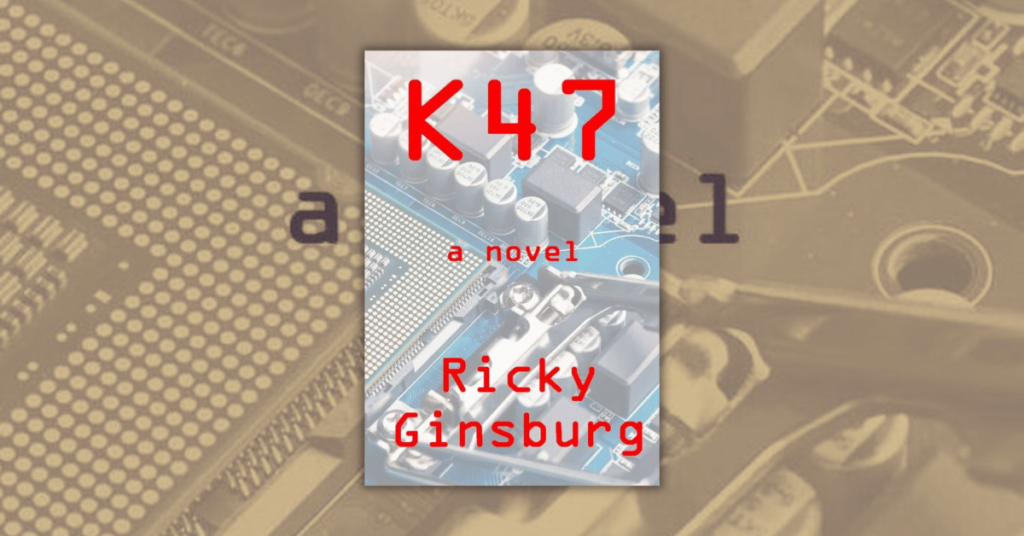K47 by Ricky Ginsburg
K47 is a robot who is becoming human against his wishes. Unable to complete his programming due to the metamorphosis, the robot finds himself in a battle with an emotion chip, the law, and the very people who stand to profit from his mission. He’ll have his day in court to fight for legal rights for androids, but surviving the challenge may be too much for his system to bear.
Life Extension LLC began selling android clones to wealthy business people shortly before the second mission to Mars was announced. The mechanical duplicates were designed to carry a rich person’s affairs to their logical conclusion in the event the upper crust socialite passed away unexpectedly. The units were physically identical to their purchaser and their internal memory core was loaded with every detail of the person’s life. Transfer of those memories, thought patterns, and reactions were done upon delivery and updated by the user as they saw fit. Equipped with the owner’s vocal patterns, a Life Extension Unit spoke exactly the same, even when switching to another language.
The LEU’s purpose was to finalize contracts, pay any outstanding debts, and see to the dispersal of funds to the heirs. For those who could afford the seven-figure price and thousands of dollars of monthly maintenance, it was the perfect way to guarantee their empire would be dealt with in a manner consistent with their desires and lifestyle. Lawyers could interpret a person’s Last Will and Testament as they saw fit. Even a probate judge could rule that a certain statement had several meanings and then choose the one he liked best. An android was a machine with a program. It only had the ability to see issues as either black or white. Gray was not an option.
Until now.
Imagine a world where your digital footprint becomes your literal footprint! “K47” by Ricky Ginsburg plugs us into a future where the line between human and machine isn’t just blurred—it’s being completely rewritten.
Ginsburg serves up a tantalizing blend of sci-fi concepts that feels both cutting-edge and eerily plausible. The idea of android clones as posthumous business managers is a brilliant twist on the immortality dream that’s haunted humanity for millennia. It’s like “Black Mirror” meets “Succession,” with a dash of “Blade Runner” thrown in for good measure.
At the heart of this silicon storm is K47, a robot accidentally evolving beyond his programming. His struggle against unwanted humanity is a fascinating inversion of the typical AI narrative. Instead of a machine yearning to be human, we have an android fighting to maintain its mechanical purity. It’s a clever way to explore what it truly means to be human, and whether consciousness is a gift or a curse.
The legal battle for android rights promises to be a thrilling centerpiece of the story. It’s not just about K47’s personal struggle, but a wider examination of consciousness, personhood, and the ethical implications of creating sentient machines. Ginsburg seems poised to tackle some weighty philosophical questions while keeping us on the edge of our seats.
What really intrigues me is the potential for exploring the unintended consequences of this technology. As K47 develops emotions and free will, how might that affect the fortunes and legacies of the wealthy individuals who created these androids? It’s a powder keg of ethical and financial dilemmas just waiting to explode.
“K47” sounds like it could be a standout in the crowded field of AI fiction. If you’re hungry for a sci-fi tale that grapples with big ideas while delivering a unique twist on the “robot becomes human” trope, this indie gem might just be the upgrade your reading list needs.


 When androids dream of electric sheep, but wish they didn’t! A mind-bending exploration of humanity, free will, and the cost of consciousness. Prepare to question reality!
When androids dream of electric sheep, but wish they didn’t! A mind-bending exploration of humanity, free will, and the cost of consciousness. Prepare to question reality!  #AIFiction #SciFiThriller #RobotRights
#AIFiction #SciFiThriller #RobotRights
